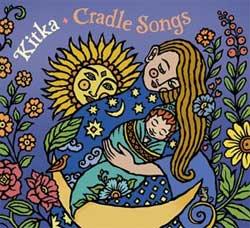Cradle Songs

Although happily childfree, I like kids and am intrigued by that idiosyncratic collective experience known as childhood. I am especially fascinated by the many ways we share the histories, humor, and ideologies of our cultures. I try to stay abreast of how these things are communicated. I pay close attention to what music is marketed to children (when, why, and by whom). I'm also a lover of a cappella and a Russophile to boot—all of which more than explain a desire to review Cradle Songs, the latest album from American all-women's vocal ensemble Kitka.
A quick glance at the band's bio would lead any listener to believe that there is simply nothing that Kitka cannot accomplish. Indeed, theirs is a truly inspiring career. The world-renowned ensemble—whose name means “bouquet” in both Bulgarian and Macedonian—has been standing tall as a shining example of musical integrity ever since their humble beginnings in 1979, performing as a group of enthusiastic amateurs. Since then they've transformed into a professional group with a revolving roster of singers, releasing nine albums on their own Diaphonica label, lending their talents to creative endeavors great and small, and wowing audiences around the world. They expend a tremendous amount of energy on research, carefully culling authentic songs and stories from Eastern Europe. The choral collective operates out of Oakland, California as a non-profit organization, sometimes selling songbooks to accompany their album releases and offering vocal workshops. If their primary mission is to share the beauty of traditional Eastern European music, then it would seem giving back to the community comes in as a close second.
Unless boasting big-name talent or universal appeal, it's rare for children's music to draw accolades from mainstream media outlets. Yet Kitka's Cradle Songs has garnered glowing praise from National Public Radio and The Los Angeles Times, and it's easy to understand why. Women of varying ages, races and backgrounds lend their voices to a stunning selection of international lullabies, mostly from countries in the Mediterranean and Eastern Europe. Much like their colleagues Le Mystère des Voix Bulgares Kitka is a group that excels at “exquisite harmonies.”
As would be expected, this is a predominantly vocal outing. Musical instruments are used sparingly and are often unique. For example, the CD opens with the Russian Jewish tune “Cradle Song,” which features both a toy piano and a toy glockenspiel. The result is eerily tranquil. Cradle creaks are a listed instrument on “Dzurk, Dzurk,” a song from the Russian Federation republic of Komi. Bulgaria's “Lale Li Si, Zjumbjul Li Si, Gjul Li Si” is awash in a warm keening wave of polyphony that leaves the listener spellbound. Kitka even manages to incorporate a hybrid bedtime story, featuring elements from Russian fairy tales and Hungarian stories, with the Ukrainian “Hajči, Meni, Hajči” sung over the top. One odd note worth mention: according to the translations provided, six of the seventeen lullabies specifically address male children. Could that be why the songs were saved for posterity? Could this be an indication of favoritism of male children in these cultures?